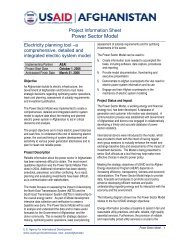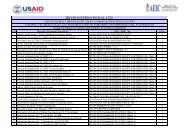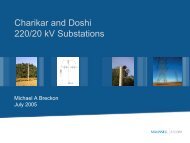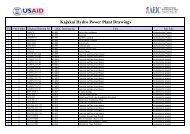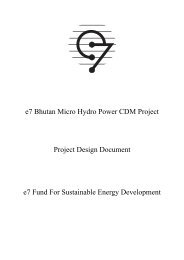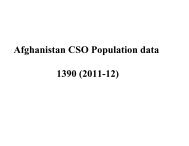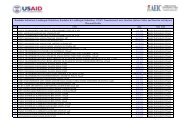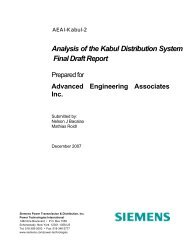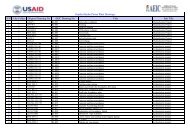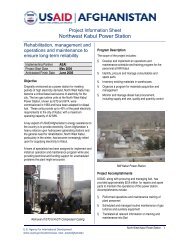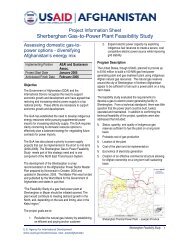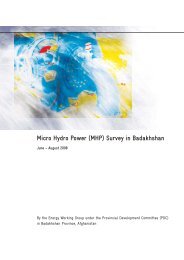prioritization and implementation plan - Cooperazione Italiana allo ...
prioritization and implementation plan - Cooperazione Italiana allo ...
prioritization and implementation plan - Cooperazione Italiana allo ...
You also want an ePaper? Increase the reach of your titles
YUMPU automatically turns print PDFs into web optimized ePapers that Google loves.
BUILDING GOOD DEMOCRATIC GOVERNANCE AND THE RULE OF LAW<br />
Governance Cluster Members: The Supreme<br />
Court, Ministry of Justice, Office of the Attorney<br />
General, Independent Administrative Reform <strong>and</strong><br />
Civil Service Commission, Independent<br />
Directorate of Local Governance, High Office of<br />
Oversight for Implementation of Anti-Corruption<br />
Strategy, Office of Administrative Affairs,<br />
Afghanistan Independent Human Rights<br />
Commission, <strong>and</strong> Ministry of Finance. The<br />
Ministry of Rural Rehabilitation <strong>and</strong> Development,<br />
the Ministry of Interior <strong>and</strong> the Controller <strong>and</strong><br />
Audit Office are also represented in working<br />
groups.<br />
Situation Analysis: The government of<br />
Afghanistan has made significant strides in recent<br />
years in establishing <strong>and</strong> developing modern<br />
institutions of democratic governance. At the same<br />
time, ongoing democracy-building efforts face<br />
multiple challenges. The absence of adequate<br />
channels for Afghan citizens to voice their needs<br />
<strong>and</strong> aspirations, continued bottlenecks to the<br />
delivery of essential public services, poor reach<br />
<strong>and</strong> unclear relationships between sub-national <strong>and</strong><br />
central government institutions, corruption <strong>and</strong> the<br />
subversion of public finance rules, the limited<br />
presence of the State judiciary <strong>and</strong> the timely<br />
dispensation of justice, <strong>and</strong> neglect of human rights<br />
<strong>and</strong> civic responsibilities promotion all erode the<br />
legitimate authority of Afghan State institutions.<br />
Countering these effects requires an integrated<br />
approach <strong>and</strong> a leadership team committed to<br />
immediate action. Ultimately, the true measure of<br />
success will be whether the Afghan people begin to<br />
accept their government as service-oriented,<br />
credible, <strong>and</strong> legitimate.<br />
Needed Response: The Goal of Governance as<br />
presented in the Afghanistan National<br />
Development Strategy is to: “Strengthen<br />
democratic processes <strong>and</strong> institutions, human<br />
rights, the rule of law, delivery of public services<br />
<strong>and</strong> government accountability.” The Afghan<br />
Ministries <strong>and</strong> institutions in the Governance<br />
Cluster are focused on a “whole-of-government<br />
effort” to prioritize key actions that demonstrate<br />
immediate results to the people. The Governance<br />
16<br />
Cluster has defined the following set of Strategic<br />
Objectives to guide its work at both central <strong>and</strong><br />
local levels: (i) A focus on governance reforms <strong>and</strong><br />
capacities; (ii) Access to <strong>and</strong> delivery of justice;<br />
(iii) Human rights <strong>and</strong> civic responsibilities for the<br />
population; (iv) Strengthening governance systems<br />
at all levels; <strong>and</strong> (v) Transparency, accountability,<br />
<strong>and</strong> integrity of government <strong>and</strong> democratic<br />
processes <strong>and</strong> institutions. In support of these<br />
objectives, the following National Priority<br />
Programs are proposed:<br />
1. National Priority Program for Financial <strong>and</strong><br />
Economic Reforms: A comprehensive program of<br />
reforms to strengthen the Afghan economy <strong>and</strong><br />
ensure that public funds are used in a transparent<br />
<strong>and</strong> responsible manner is necessary for effective<br />
governance. The public financial management<br />
reform agenda is proposed as a series of five interrelated<br />
activities that together aim to achieve more<br />
than the sum of their parts: (i) A move toward<br />
fiscal sustainability through gradual increases of<br />
domestic revenue; (ii) Strengthening the budget as<br />
an instrument of government policy; (iii)<br />
Improving budget execution; (iv) Developing<br />
capacity to implement effective programming; <strong>and</strong><br />
(v) Increasing accountability <strong>and</strong> transparency in<br />
public finances.<br />
2. National Transparency <strong>and</strong> Accountability<br />
Program: The program aims at countering rising<br />
perceptions of corruption by increasing the<br />
transparency <strong>and</strong> accountability of procedures <strong>and</strong><br />
controls through specific projects devoted to: (i)<br />
Building effective <strong>and</strong> independent oversight<br />
institutions; (ii) Monitoring <strong>and</strong> evaluating the<br />
performance of Government institutions <strong>and</strong><br />
officials; (iii) Facilitating systems <strong>and</strong> process reengineering<br />
of central <strong>and</strong> local government<br />
finance; (iv) Creating effective mechanisms to<br />
prevent corruption <strong>and</strong> the misuse of public office<br />
for private gain; (v) Reinforcing the integrity of<br />
public <strong>and</strong> business sector relationships; (vi)<br />
Promoting transparency <strong>and</strong> providing citizens<br />
with information in an easily accessible <strong>and</strong><br />
underst<strong>and</strong>able manner; <strong>and</strong> (vi) Increasing<br />
political accountability.




